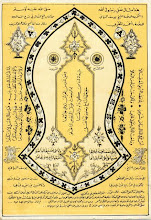Iman:
Linguistically – ‘amaana’ – ‘having safety’ or ‘accepting and confirming a certain manner.’
Shariah – ‘accepting and confirming everything that the Prophet (saw) came with of that which is necessarily known to be part of the religion.’ Not limited to just the basics of beliefs but everything that comes in the religion that everybody knows about.
Islam:
Linguistically – ‘al inqiyaadh’ – ‘submitting to something’
Shariah – ‘one submits to everything that the Prophet (saw) came with of that which is necessarily known about the religion.
***
Many of us, if asked "do you believe in God?", would answer in the affirmative. Some of us might try and give some proofs. For example, we might cite nature (the trees, the clouds, the mountains, etc) as a proof or go about using other methods to prove the existence of the creator.
These proofs in and of themselves are of no benefit if they do not lead to submission to that Creator. In other words, if we do not implement the Rules that the Creator has laid down, then we are not truly believing in His existence because if we believe in His existence and everything that entails than we would realize that this world is an Illusion and there is nothing real about it.
We would realize that the time we spend on this earth is very short and after this life, we will either have eternal joy or eternal damnation.
Reflect on the Quran, brothers and sisters, where Allah (swt) says that the people when resurrected will think that they spent only a day, or an evening, or a few hours on Earth.
The Hereafter is ETERNAL.
That is something that cannot be explained in words, one can only experience it.
Imagine the most pain and torment you've felt in you're life. Now imagine increasing that pain to a level of infinity in both duration and depth.
Imagine the most pleasurable thing you've enjoyed in you're life. Now imagine increasing that pleasure to a level of infinity in both duration and depth.
The former is a description of hellfire and the latter is a description of paradise.
How does one attain jannah?
It is not only through Iman (affirming and confirming the religion) and Islam (submitting to the religion) but also Ihsan (attaining perfection in the religion).
How does one attain Ihsan?
1. Stop committing major sins and seek repentance for the one's you've done.
2. Keep firm to your prayers.
3. Establish a relationship with the Quran. At least one juz a day.
4. Do dhikr of Allah (swt) constantly.
5. Seek knowledge from trustworthy people.
6. Keep the company of the righteous.
The last point is the most important. A person is with whom He loves on the Day of judgement. If you keep the company of murderers in this life, they will be your company in the hereafter. If you keep the company of fornicators in this life, they will be your company in the hereafter. If you keep the company of people of the dunya who follow their desires, they will be your company in the hereafter.
If you keep the company of the people who seem to be headed towards hellfire, then that is a good estaimate of what your destination will be as well.
Instead of allowing yourself to slowly slip into utter destruction by refusing to do absolutely nothing and causing yourself to stagnate, grab ahold the Rope of Allah (swt)!
The path of spiritual ascension begins with making sincere dua.
If you are a sinner, then make sincere d'ua to Allah (swt) and invoke his name "Al Rahman" or "Al-Raheem" and beg for His Mercy and vow never to do it again.
If you think that you are not a sinner, then you are deluded.
Allah (swt) is closer to you than your jugular vein. He is aware of when you sin, so that should stop you from sinning. However, should you slip into sin, recall His proximity and be quick to make istighfar and do a good deed for a good deed wipes away a bad deed.
What is ihsan? "To worship Allah as though you see Him and if you cannot, then know he sees you."
If you do not worship Allah in this manner, then you may have iman and islam, but you do not have ihsan and therefore, you are deficient.
Do not be deficient in your deen for deficiency leads to the hellfire.

